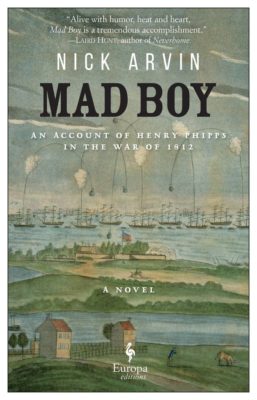Review: Mad Boy by Nick Arvin

A brisk, tidy adventure story.
It’s 1812, and America is fighting the British redcoats.
Henry Phipps’ mother talks so much that after she dies, Henry still hears her chattering voice.
Her final wish is to be buried at sea.
Henry places his mother in a barrel of pickle brine and begins dragging her through the mayhem of battle towards the sea. Adventures ensue.
This is a playful picaresque story with a bright cast of characters.
It did hold my attention and I found it well written, however there wasn’t anything particularly memorable about it.
I wanted this book to make me cackle like a mad villain, but it didn’t.
There were moments of humour, but I was expecting much more grotesque comedy. I wanted Henry to be slopping about with a decaying body to the horror and confusion of the other characters. Unfortunately, Henry’s mother doesn’t feature very much at all, which I think was a missed opportunity.
The author seemed to be treading very conservatively to make compromises between what would be believable and what would be fun. There was room for the story to be at least a little more extravagant and outrageous.
It never felt like the stakes were very high. The author’s presence was always there, ready to pull the strings so the plot would neatly fall into place. One or two times I felt cheated because a supporting character appeared at just the right time after resolving a major challenge beyond the reader’s view.
Another criticism: The character Morley is a sexual predator. Yes he’s the villain, but he’s also presented as a laughable buffoon. I personally don’t find sexual harassment comedic.
In terms of depicting African American people, nothing in particular stood out to me, neither bad or incredible, so I would just have to say that the author was sensible.
Overall it was a nice book. The pace is fast and the story is fun. And it was comforting to feel like a happy ending was guaranteed.
I rate it 3 out of 5 pickled parents.
Another playful historical fiction set in America, ‘The Sisters Brothers’ by Patrick DeWitt: